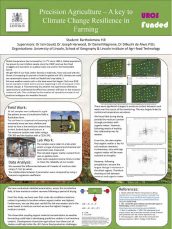By Bart Hill //
 How dry was your summer this year? Did it feel hotter than usual?
How dry was your summer this year? Did it feel hotter than usual?
This summer’s heatwave reached highs of 32.6 degrees Celsius and events like this are becoming more severe and frequent within the UK. The world is experiencing greater climate change than ever, and this is mainly due to an enhanced global warming effect caused by human processes. Rising populations, Climate Change and Global Warming aren’t just changing our weather they are also affecting our food production and if this isn’t managed we could see mass crop loss in years to come.
My project, based on a field in Riseholme, took place at the end of this summer’s heatwave and aims to help better understand how these drying periods will affect our soils and in turn how we as a nation will continue to produce food. 95% of our food comes from soils and if we don’t protect this finite resource we may find ourselves struggling for food.
I mainly focused on how moisture content is affected by different factors including rainfall, grainsize, organic matter, etc. I gathered a large dataset over a 4-week period which has given me a better understanding of both the research process and the controlling factors of soil moisture content. During the process I worked closely with the Lincoln Institute for Agri-food Technology and the Lincoln School of Geography which gave me an insight into academia and allowed me to develop new techniques for looking at soil properties.
The project has allowed me to consider the future potential of this research. Placing all the factors affecting soil into predictive soil moisture models’ researchers and farmers will get a better understanding of soil water retention and which areas are more at risk from crop loss and damage. This could improve crop yields and help aid with precision agriculture and could be used on a global scale.
*To view Bart’s project poster, please click on the thumbnail below:

